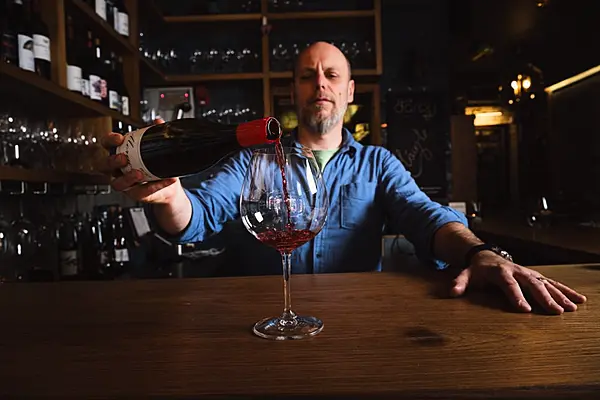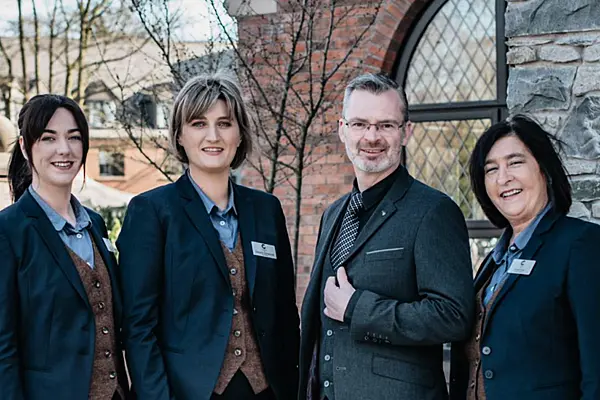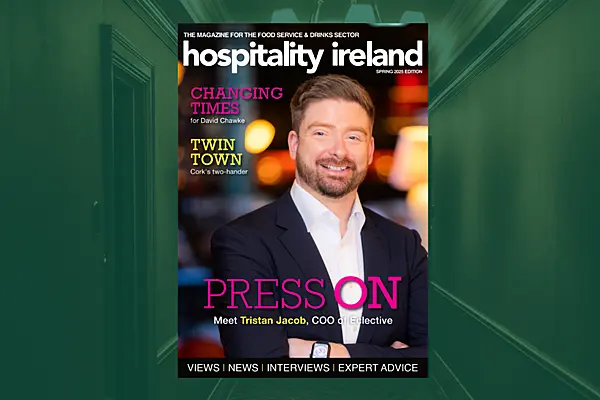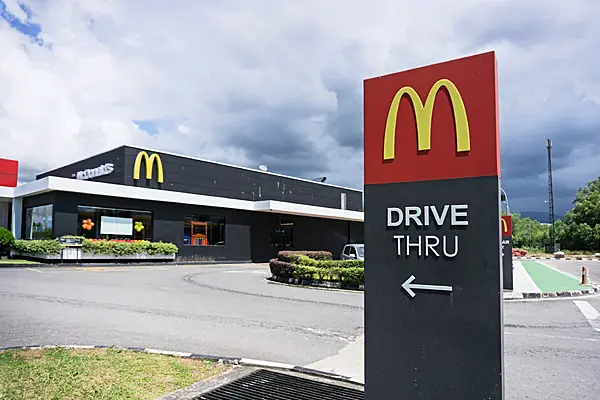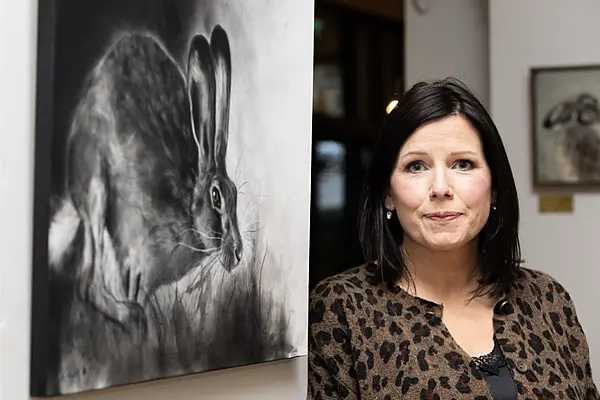Ronan Flood is the publican behind the Refresh Hospitality group, which includes the popular Oscar’s Café Bar, in Smithfield, Barbers’ Bar, and Doyle’s Corner. Flood is also an outspoken advocate for the hospitality industry, and an inventive operator. Here, he talks to Hospitality Ireland about reopening, and what’s next.
This article was originally published in the Autumn 2021 issue of Hospitality Ireland Magazine, in October of 2021.
“We’re getting there,” says Ronan Flood, when I ask him how the reopening phase has been for his businesses. “We’ve returned to 75%. We had 50 staff on our payroll, pre-Covid, and now we’re back up to about 40 staff at the moment, so we’re nearly back with the same staffing levels as before.”
They were, Flood says, “lucky during the lockdowns, in the sense that we launched, in Oscar’s, a very successful hot bar last October. We got closed down on a Tuesday, and the following week, we were ready to go with a hot bar, doing mulled wine and hot whiskey. The intention there was never really to make money – it was to keep some staff on board and keep them engaged. That proved to be very successful, to the point where I was able to bring back about six staff in total back into Oscar’s during the lockdown. Then we turned the hot bar into a frozen bar after the Christmas lockdown, serving sorbet aperitifs and Porn Star [passion-fruitflavoured] Martinis, and the like – everything was frozen. We were lucky that – between Oscar’s and the Barbers’ – we managed to retain a team of about eight, so when it came to reopening, we were in a good position, in that we had our core staff.”
So he wasn’t scaling up from nothing, as some places were?
“Yes. We were very lucky, in that respect – we were kept very busy. I had this bizarre situation, where my head chef from Oscar’s and my head chef from Doyle’s Corner spent most of their time making mulled wine in the kitchen and cutting lemons for the hot drinks. It was never about making money. It was about breaking even, just to keep the team engaged.”
As part of the frozen-bar service at the Barbers’, Flood provided scooters for his employees.
“That was quite funny,” he recalls, “because, at the time, everyone was giving out about Portobello and the rubbish that was being left behind, but our lads were wearing branded jackets, going up and down the road on scooters, cleaning up and interacting with crowds. It was a very visual thing – it was fairly noticeable that these guys in branded jackets were constantly slipping up and down the road.”
And creating a great deal of goodwill, I imagine?
“Absolutely. We were very much complimented on that. The lads, literally, were like the Pint Police, going up and down on the scooters, making sure people weren’t standing in front of houses and the like, so the Barbers’ proved quite successful for us, and we got a lot of publicity, too.”
This was around the time when there was a great call for public lavatories, and outrage at outdoor urination.
“We launched what we called the ‘urination donation’,” Flood says. “We were charging €2 in to use the toilets at the Barbers’, and we managed to raise €5,000 for charity. That kept the neighbours on side as well because people had no excuse to go to the bathroom in hedges or a garden.”
“[Once last summer’s reopening came] – there again, we were very lucky in Oscar’s,” Flood says. “Dublin City Council were excellent. They gave us a very large area outside – the cobbled area on the square. We also had our own outdoor area, which we’ve always had, in which we were able to build structures for shelter, so we ended up at the start of December with seating for about 150 outside, which was absolutely phenomenal. We were absolutely blessed, and we operated a policy of walk-ins only, so we weren’t taking bookings and we had a two-hour limit on tables. We were able to turn the tables. We sold it as that we were operating as a restaurant, so we did require food to be ordered, and that was good for revenue. With the Barbers’, because of the proximity to the park, we did extremely well there also.”
However, as he readily points out, it wasn’t all good news.
“The other side of the coin is: we’ve another property up in Phibsborough – Doyle’s Corner – and because of issues there – mainly the difficulty in recruiting staff, and because it lacks an outdoor area – we delayed our opening until 19 August.”
So he’s seen it from both sides?
“Very much so. I’m under no illusions that if our business was just Doyle’s Corner, on its own, we’d be in a very precarious financial position right now. I really think we’d be struggling to see out the year. I think that’s how serious the situation is at the moment around the country, so you are right, in the sense that we’ve seen the best and the worst of both sides.
“We were able to continue trading during lockdown, and we did well with outdoor seating, but Doyle’s Corner is a struggle at the moment. We’re getting there. We started back there with a brand-new team. We kept the core staff, i.e. our two managers and our head chef – we managed to retain them, thankfully – but we’re literally starting all over again in Doyle’s. It will be fine, but it’s tough going up there at the moment.”
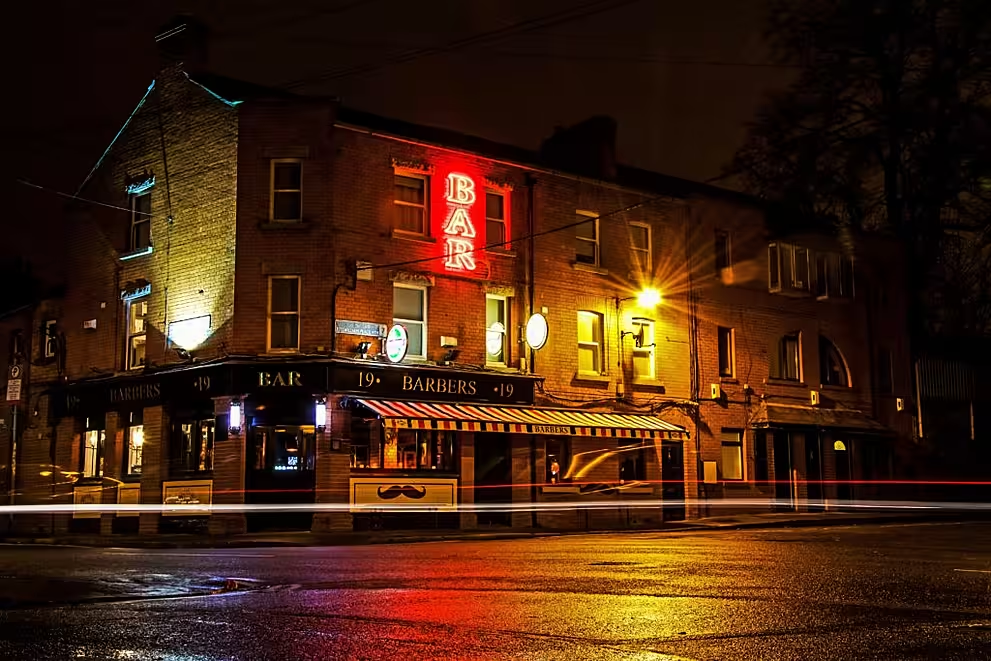
Barbers
Location, Location
This, of course, I say, highlights the fundamental unfairness of the Covid pandemic measures – not anyone’s fault, but the fact is: a really good business could still be annihilated by being in the wrong place. Locations that were once highly desirable became, over the last 18 months, impossible because of their lack of proximity to residential properties.
“No question about it,” Flood agrees, “and that is the issue up in Doyle’s Corner. That was always quite events driven, and during the lockdown, we continued investing in terms of doing up the function spaces that are there. Thankfully, the penthouse is booked out between now and December, which is fantastic – as you know, all you need is that group of 60 on a Friday and a Saturday night to help get you over the line – but the problem was the lead time. Obviously, when we reopened in August, no one was ready for booking a party for the following month, so it was about trying to get that steady.
“Getting events and bookings in is a challenge at the moment, but what we are finding – and I think it’s going to be a huge problem this year for Christmas – is that, for those that are booking, the numbers are washing down significantly. Even when anyone does come in looking to book a Christmas party for 100, the likelihood is that numbers are going to wash down significantly on the night because there’s so much uncertainty out there. People aren’t even sure if they’re allowed a party, and, of course, we’ve been asked, ‘Are you going to be checking passports in December? Are all of your staff vaccinated?’ We don’t actually have the answers to those questions.”
The uncertainties are still very much there.
“The uncertainty is absolutely massive, and also what we’re seeing is that people just don’t want to dine inside. I think that’s going to change as the weather deteriorates, which it inevitably will. I think there is going to be a seismic change, with people moving back inside.
“I’m torn!” he laughs. “On one hand, I really wish it would start raining, to help Doyle’s – bad weather is really good for business – but, on the other, my heart goes out to the publicans that don’t have covered outdoor areas. It reinforces the point that supports are going to have to continue well into the new year.”
Does he think that that will happen?
“Some support will last until March, but they’ll probably taper that off. I don’t think business levels will return to normal at all quickly. I really don’t see things changing until next summer. In my heart of hearts, I don’t see St Patrick’s Day happening as usual in March.”
It seems unlikely, I agree. There are many positive signs, but the numbers are still uncertain. Does he think that the government could be offering more clarity than it is, in terms of what can happen for hospitality businesses?
“I think a clear plan is definitely required, but, unfortunately – I think as we’ve seen – the Covid situation is proving to be so unpredictable. I can understand why the government are nearly nervous to nail their colours to the mast, in terms of setting out a clear agenda, as things can change so rapidly.”
Has he some sympathy for it?
“Well, I don’t know if I’d go as far as sympathy!” Flood says, with a laugh. “No, I wouldn’t use the word sympathy. I think the industry – all of us, at some point, are going to have to bite the bullet. Life is going to have to continue. We’ve been talking about living with the virus for the past two years, so let’s see that in action.”
At the moment, there’s still a kind of emergency footing, I say.
“Absolutely. The uncertainty out there is just colossal. I’m from a hotel background, myself, so, for hotels, even trying to plan for next summer is hard. The whole industry needs certainty.” How far ahead is Flood planning with his businesses, or is he just trying to keep flexible – keep moving week by week?
“Christmas is at the forefront of a lot of our work at the moment. We’re putting all our menus in place now. It’s definitely going to be a Christmas like no other because previous Christmases, we might have had seating for 200 people, but we could easily take bookings for finger food for 300 or 350. We can ‘rack them and pack them’ for Christmas, but this time round, there are huge implications around whether everyone has to remain seated. We are going to be at significantly reduced capacity for the Christmas period.
“For example, I had a large company that booked out all of Doyle’s Corner. They were paying a good minimum spend – they were paying room hire – and then, a few weeks ago, I got an email to say, ‘Ronan, look, we’re really sorry. We love your venue, we’d love to come back again, but head office has dictated that we’re not having a Christmas party this year.’ Now that’s a scary thought, and I suspect that’s going to be replicated throughout the city and country for Christmas.”
How does he feel about the next six months, in terms of optimism?
“I think huge challenges remain. I don’t expect that on 22 October there will be a massive relaxation of guidelines. That would worry us a lot. I think the staffing situation is still challenging, and it’s exacerbated by, in the past week or two, a lot of college students returning to their studies. We would have had a lot of staff that were full-time with us over the summer, but now they have been reduced to two to three days per week because of the need to go back to college.
“On top of that, Covid is not going away. We’re finding that at least once a week, a staff member says, ‘My partner has contracted Covid, and I need to isolate for 14 days,’ or a roommate, or a child. Thankfully – touch wood – we haven’t had any outbreaks of Covid originating in work here, but the big white elephant in the room – which probably a lot of places are not talking about – is staff constantly being out because they have to isolate. So, what we’re finding – particularly with chefs at the moment – we find ourselves overstaffing and over-hiring as an insurance policy.
“You know, we had a situation in the past week or two where we have a chef that works in Doyle’s and one Oscar’s, and they share a house. One of them got Covid, and that knocked our two chefs out because one had to go into isolation – literally overnight, we lost two chefs. Now, thankfully, both of them are back, and there are no issues. One’s fully recovered and the other never caught it, but it’s very challenging to be constantly losing staff due to isolation.”

Clarity
So, what would make life easier? What would Flood like to see happen, from a state point of view?
“I think clarity on what supports are remaining in place or what else is coming down the line. Are they going to be waiving rates next year? Are they going to be waiving the licence renewal fee? Secondly, there’s talk about relaxation of guidelines on 22 October – what relaxation is there going to be? One thing that I do dread, and I suppose the one major criticism I would have of the government since the whole thing kicked off, was the lack of communication. Too many times we learned about new guidelines from the media, not directly from the government. It would start about two weeks prior to the announcement, and then when they announced the ludicrous measures – like we needed to log what people had to eat, or the €9 meal – they’d say, ‘but knew this was coming…’ The thing was: we didn’t know it was coming. Yes, we read the papers, but that’s just hearsay. I just wish there was more clarity and more communication from the government regarding restrictions.”
In terms, then, of broader initiatives around staffing, for example, does he see a role for the state there?
“I do, actually. What was a massive help was being able to apply for visas for a chef. I don’t see any reason why they can’t introduce similar initiatives to help us get skilled bartenders, cocktail bartenders, and even floor staff. I think that would massively help, if there was a system put in place for us to apply for staff visas. Good management is equally challenging at the moment, with so many having left the industry, so I don’t see any reason why we shouldn’t be able to hire managers from outside the EU as well. I suppose that’s the main one. I’m sure there’s lots more the government can do to help us recruit staff, certainly – maybe funding training schemes for staff as well?”
Does Flood feel that the industry is taken seriously, from a governmental point of view, when it is making plans, thinking about where to allocate resources, and generally connecting with what needs to be done? Does he think that the hospitality industry features highly enough on the agenda?
“I used to. There used to be lots of talk about the vintners [Vintners’ Federation] of Ireland and so on being a strong lobby group, but it’s very clear it’s not as strong a lobby group as previously thought. The farmers have more say than the hospitality industry do at the moment – they’re listened to more. I’m not saying that the industry has been treated with contempt, because that’s a strong word, but a bit casually, perhaps.”
A lack of understanding that these are real people’s jobs, real people’s lives, real people’s outlooks ...? “Yes.”
So, what’s on the agenda for the next few months?
“Again, with the lack of clarity at the moment, I think if the government announces a relaxation of restrictions on 22 October, we’ll see a lot of enquiries. I can understand why no companies are going to really book large Christmas parties at the moment – because they don’t know, any more than we do, what the lay of the land is for December.
“We are, of course, still continuing with our gimmicks!” he laughs. “We’re planning Santa Claus in Oscar’s for December, where you can come and get your photograph taken with Santa Claus. We’re doing a doggy winter market in December. We’re still working away something crazy!”
And clearly never short of good ideas ...?
“Ah, we do have a good bit of fun,” he says, but he’s serious, too. “We also invested a lot in technology during the lockdown, in particular with the Barbers’ Bar. We’re getting ready now to go properly live with that. What we did first was, we built an app to take over ordering. At one point during the summer, when you were allowed outdoor dining, we had a system in place whereby there was one bartender standing at the door of the Barbers’ and customers were asked to place their order with the app, so they might order a pint of Guinness and a beefburger. Via the app, the pint of Guinness would print out behind the bar, and because we got the app talking to our printer in Oscar’s, the burger would print out there. The meal was made in Oscar’s, and I’d jump on my scooter and deliver it myself. So, you might be sitting inside the Barbers’ with your pint, and I’d rock up on my moped with the burger. It was a brilliant bit of new technology, in that respect.”
“What we’re doing now is, we’ve managed to get that app as an iframe [an inline frame, to embed another document within an HTML document] on our website: TheBarbers.ie. You can go to the website, where you can play the jukebox, request a song for free on your phone, place an order for your meal, and place an order for your drink. It’s very much a younger generation going in there, as it’s close to the TU [Dublin] campus.
“We’re getting ready to launch a new ‘appy hour’, so we can actually programme the app so you can get a pint for whatever the deal of the day. We can do our specials on the app. That’s our next big project to launch now: an intranet to be used within the bar.”
So it’s not a shop window, I say – it’s a fully functioning platform?
“Yes, and we’re pretty proud of that.”
“[This kind of innovation] keeps us going,” says Flood. “At the moment, up in Doyle’s, we moved our accountant out of the penthouse level during lockdown and created an event space for about 50/60 people, with its own outdoor space. We’re putting a big push on the penthouse at the moment.”
Another thing that has caught his imagination is the idea of a sports bar.
“The GAA final in Doyle’s Corner – that was a great morale booster because we did very well out of it, so we literally decided on that day that we’re going to turn our first-floor space into a sports bar.
“I think one thing lockdown made us realise is that we need to diversify from the events as well. Monday to Thursday is your bread-and-butter stuff, so we’re now trying – not to walk away from the events, but to diversify a bit more and make that event space a bit more multifunctional.
“It’s tough,” he admits, “and when times are tough, it’s difficult to invest, but we are confident. We think things will get back to normal, and we want to be ready for that, so we are going to continue to invest because I think everyone likes to get a return on investments, and we’re confident we will.”
Read More: Hospitality Ireland Autumn 2021: Read The Latest Issue Online!

